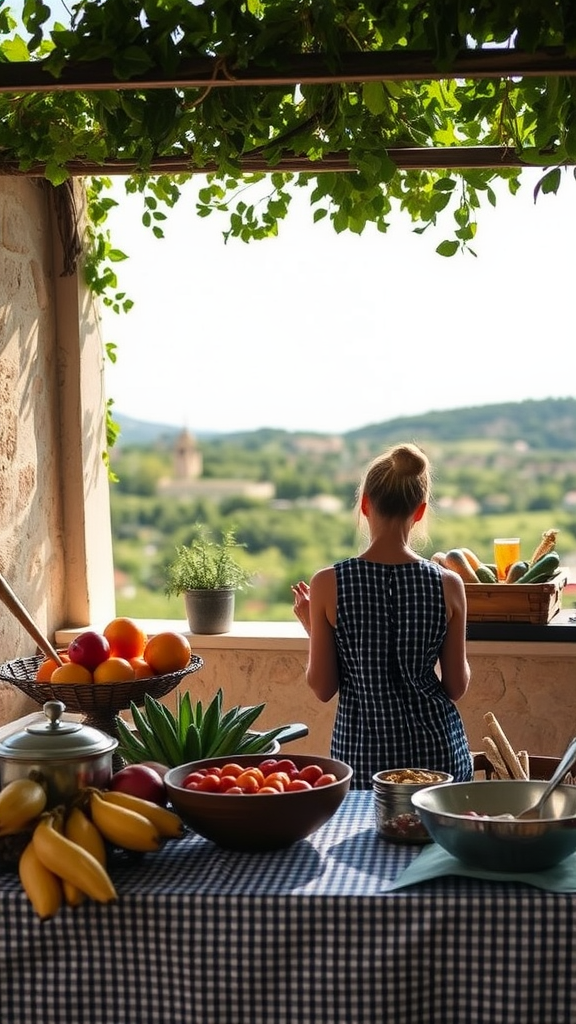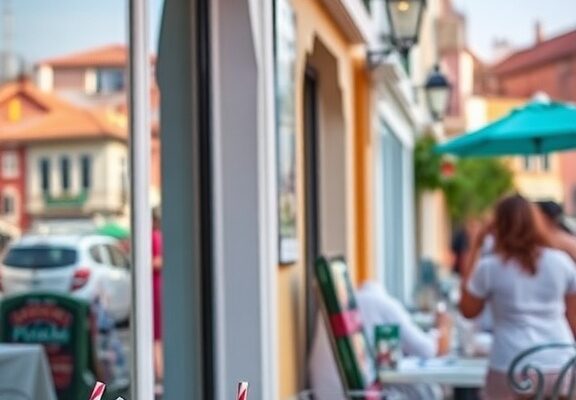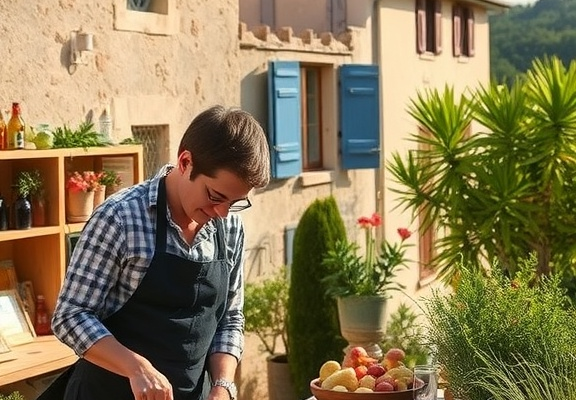Top Culinary Schools and Workshops for Cooking Classes in Provence
Provence, with its stunning landscapes and rich culinary traditions, is an ideal place to learn how to cook. Whether you are a beginner or an experienced home chef, taking a cooking class in this beautiful region can enhance your skills and deepen your understanding of French cuisine. Here are some top culinary schools and workshops where you can immerse yourself in the flavors of Provence.
Thank you for reading this post, don't forget to subscribe!One of the most renowned culinary schools in Provence is L’Atelier des Chefs located in the heart of Aix-en-Provence. This school offers various classes focused on classic French techniques as well as regional specialties. From baking fresh baguettes to preparing a traditional bouillabaisse, you’ll gain hands-on experience with the guidance of professional chefs. Classes often emphasize using fresh, local ingredients, giving you a true taste of Provence.
Cooking in Provence is another fantastic option. Set in the picturesque countryside, this workshop provides a unique experience by coupling cooking classes with excursions to local markets. You will have the opportunity to choose fresh produce and ingredients directly from local vendors, allowing you to understand the importance of quality in cooking. The classes here range from making delicate pastries to crafting robust stews, ensuring that you learn a wide array of culinary skills.
If you’re interested in learning from a Michelin-starred chef, consider La Chassagnette, run by Chef Armand Arnal. Located near Arles, this culinary workshop emphasizes the farm-to-table philosophy. The classes typically begin with a visit to the chef’s vegetable garden. You’ll harvest fresh ingredients before returning to the kitchen to create exquisite dishes. This immersive experience not only enhances your cooking abilities but also helps you appreciate the connection between food and its sources.
An experience at Les Petits Chefs in Avignon is particularly delightful for families. This workshop focuses on engaging children in cooking, allowing them to explore the culinary arts in a fun and supportive environment. Parents can also join in the fun, making it a perfect family activity. The classes are designed to be interactive, and children gain confidence while learning to prepare simple yet delicious meals, from pasta to pastries.
For those seeking a more personalized experience, Private Chef Provence offers tailored cooking classes right in your rental home. Initially, you’ll discuss your culinary goals and dietary preferences with a professional chef, who will then create a custom class just for you. This tailored approach allows for a more intensive learning experience, helping you focus on specific skills or recipes that pique your interest.
Le Foodist is another excellent choice for culinary enthusiasts. Located in a charming district of Paris, this school occasionally runs workshops focused exclusively on Provençal cuisine. These classes highlight the seasonal ingredients typical of the region and teach you how to incorporate Mediterranean flavors into your cooking repertoire. The hands-on experience is complemented by wine pairings that enhance the overall gastronomic training.
Do not miss out on the cooking classes offered by Cuisine de Provence. Located in the Lauch Valley, this school specializes in traditional Provençal dishes like ratatouille and tapenade. Classes typically conclude with a communal meal, providing a lovely setting to share your culinary creations. The sense of community here is palpable, making it an experience you’ll cherish long after you leave.
In addition to these wonderful schools and workshops, look for seasonal food festivals in Provence. These events often host cooking demonstrations and classes led by local chefs. Participating in these festivities can be a delightful way to learn traditional methods and immerse yourself in the local culture.
To summarize, the culinary landscape in Provence is rich and diverse. Whether you prefer a structured class in a prestigious school or a more relaxed workshop in a picturesque setting, you’re sure to find a cooking experience that suits your tastes. So pack your bags, book your class, and get ready to delight in the art of Provençal cooking!
The Cultural Influence of Provence Cuisine on Cooking Classes
Provence cuisine is a delightful fusion of flavors, colors, and aromas that truly reflects the region’s rich cultural heritage. If you’re considering taking a cooking class in this stunning corner of France, you’ll discover that the local cuisine not only nourishes the body but also a deep-seated sense of community and tradition. The distinctive ingredients and cooking methods utilized in Provence have set a standard that influences culinary practices worldwide, making it essential to embrace this culinary art through hands-on experience.
One of the most appealing aspects of Provence cuisine is its reliance on fresh, seasonal ingredients. The region boasts a Mediterranean climate that allows for the cultivation of vibrant fruits, vegetables, herbs, and olive oil. In a cooking class, you’ll likely learn to incorporate staples such as:
- Tomatoes: These are the foundation of many Provençal dishes, offering both flavor and color.
- Olives: From tapenade to oil, olives are intrinsic to local gastronomy.
- Herbs de Provence: A blend of lavender, thyme, and rosemary that imparts aromas crucial to regional dishes.
- Seafood: With the Mediterranean waters nearby, fresh fish and shellfish are common in many recipes.
- Cheese: Local cheeses, such as goat and sheep’s milk varieties, bring richness and creaminess to meals.
Participating in a cooking class allows you to discover how to select, use, and combine these ingredients while respecting their cultural significance. By understanding where your food comes from and experimenting with authentic recipes, you’ll gain a newfound appreciation for the traditional flavors of Provence.
Another important aspect of learning how to cook in Provence is the emphasis on community. Food in this region often acts as a unifier, bringing families and friends together. When you enroll in a cooking class, you may find yourself not just learning but also connecting with others who share your passion for cooking. You’ll create bonds over shared ingredients and laughter, mimicking the communal spirit of Provençal dining. Sharing meals is an integral part of the cultural experience in Provence, as seen in their famous festivals and open-air markets.
Moreover, the influence of Provence cuisine extends into various traditional cooking techniques. When you take a cooking class, you may delve into age-old practices such as:
- Braising: Slow-cooking meats and vegetables to enhance flavor.
- Retaining fresh flavors: Techniques that highlight local produce, keeping dishes vibrant and healthy.
- Creating sauces: Learning how to produce rich sauces that accentuate foods is vital in Provençal cooking.
With a focus on the cultural elements behind these techniques, instructors may share anecdotes about their families’ recipes or the history behind each dish. This adds a rich storytelling aspect to the cooking experience that enhances your learning journey.
People often overlook the role of wine in Provençal cooking. Pairing the right wine with a meal significantly influences your overall dining experience. In many cooking classes, you’ll gain knowledge about the wines of the region, such as Rosé, which is not only refreshing but complements many Provençal dishes beautifully. Knowing which wine to serve can elevate your home-cooked meals, as you learn the art of harmonizing flavors.
Additionally, Provence has a unique tapestry of cultures, including influences from Italy and North Africa. This blend has expanded the local palette, which is reflected in the classes you will encounter. By immersing yourself in these diverse culinary traditions, you not only become a better cook but also develop a broader understanding of global cuisine.
Ultimately, taking a cooking class in Provence is about more than just food; it’s about embracing a lifestyle steeped in tradition, community, and deep flavors. As you immerse yourself in the local culinary culture, you will gain essential skills and knowledge that will inspire your home cooking long after your class has ended. So, get ready to chop, sauté, and savor as you embark on this delicious journey through one of the world’s most enchanting culinary landscapes.
Conclusion
Exploring the culinary landscape of Provence offers a unique opportunity to connect deeply with the region’s rich cultural heritage. By participating in classes at top culinary schools and workshops, you gain hands-on experience, guided by passionate chefs who share their expertise in traditional Provencal cooking techniques. From mastering the art of making ratatouille to perfecting the delicate balance of flavors in a bouillabaisse, these classes immerse you in the essence of Provençal cuisine.
The influence of this region’s flavors is undeniable, shaped by its fragrant herbs, fresh vegetables, and the sea’s bounty. Cooking classes in Provence not only hone your skills but also teach you about local ingredients and their origins. You’ll dive into the stories behind the dishes, learning why the use of olive oil or herbs de Provence matters so much to this gastronomical heritage.
Whether you choose a hands-on workshop in a charming village or a formal culinary school, each experience will enrich your culinary repertoire. As you savor the dishes you’ve prepared, you’ll not only taste the authenticity of Provence but also carry a piece of its culture home with you. Engaging in these cooking classes leaves you with memories, skills, and perhaps even a few new friends who share your love for food. So, pack your bags, sharpen your knives, and get ready to explore the mouthwatering world of Provençal cuisine through the vibrant cooking classes that await you.






